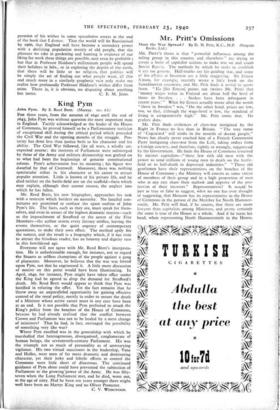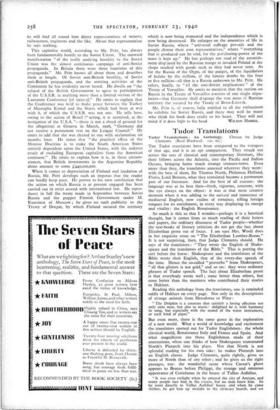Mr. Pritt's Omissions Must the War Spread ? By D.
N. Pritt, K.C., M.P. (Penguin Books, Ltd.) MR. Piurr's thesis is that " powerful influences among the ruling group in this country and elsewhere " are trying to create a front of capitalist nations to make war on and crush Soviet Russia. The methods by which he seeks to establish it are sui generis. Half-truths are his guiding star, and some of his efforts at bisection are a little staggering. Sir Ernest Simon, for example, recently wrote a little book on the Scandinavian countries, and Mr. Pritt finds it useful to quote from. " He [Sir Ernest] points out (writes Mr. Pritt) that ' money wages today in Finland are about half the level of those in Sweden. . . . Strikes have been infrequent in recent years.' " What Sir Ernest actually wrote after the words " those in Sweden " was, " On the other hand, prices are low, too, so that, although the wage-level is low, the standard of living is comparatively high." Mr. Pritt omits that. He prefers dots.
Mr. Pritt finds evidences of class-war instigated by the Right in France no leas than in Britain. " The very name of Cagoulard ' still stinks in the nostrils of decent people." News has clearly never reached him of a French Communist Party instigating class-war from the Left, taking orders from a foreign country, and therefore, rightly or wrongly, suppressed by the Government. He finds the House of Commons tenanted by sinister capitalists—" these few rich old men with the power to send millions of young men to death on the battle- field or to half-death in depressed industries." " These old gentlemen have their representatives on the benches of the House of Commons ; the Ministry will consist to some extent of members of their group and in a high proportion of men who at any rate share their outlook and approve of the pro- tection of their interests." Representatives? It would be just as true or false to suggest, what no one has ever thought of suggesting, that Moscow has its representative in the House of Commons in the person of the Member for North Hammer- smith. Mr. Pritt will find, if he counts, that there are more lawyers than capitalists among Ministers, and pretty certainly the same is true of the House as a whole. And if he turns his head, when representing North Hammersmith in the House, he will find all round him direct representatives of miners, railwaymen, engineers and the like. About that representation he says nothing.
This capitalist world, according to Mr. Pritt, has always been fundamentally hostile to the Soviet Union. The outward manifestation " of the really undying hostility to the Soviet Union was the almost continuous campaign of anti-Soviet propaganda. In Britain there were three fountains of this propaganda." Mr. Pritt knows all about them and describes them at length. Of Soviet anti-British hostility, of Soviet anti-British propaganda, and the untiring activities of the Comintern he has evidently never heard. He dwells on "the refusal of the British Government to agree to participation of the U.S.S.R. in anything more than a limited section of the Lausanne Conference [of 1922-3]." He omits to explain that the Conference was held to make peace between the Turkey of Mustapha Kemal and the States which had been at war with it, of which the U.S.S.R. was not one. He tells how, owing to the action of Brazil (" acting, it is surmised, at the instigation of the U.S.A. "—there is not a shred of ground for the allegation) at Geneva in March, 1926, " Germany did not receive a permanent seat on the League Council." He omits to add that she was elected to one with acclamation six months later. He states that " the practical effect of the Monroe Doctrine is to make the South American States entirely dependent upon the United States, with the indirect -result of excluding European capitalists from the American continent." He omits to explain how it is, in these circum- stances, that British investments in the Argentine Republic alone amount to some £44o,000,000.
When it comes to depreciation of Finland and laudation of Russia, Mr. Pritt develops such an impetus that the reader can hardly keep pace. He proves to his own satisfaction that the action on which Russia is at present engaged has been carried out in strict accord with international law. He repro- duces in full the treaty made in September between Soviet Russia and the puppet Finnish Government under M. Kuusinen of Moscow ; he gives no such publicity to the Treaty of Dorpat, by, which Finland secured the territory which is now being truncated and the independence which is now being destroyed. He enlarges on the amenities of life in Soviet Russia, where " universal suffrage prevails and the people choose their own representatives," where " everything that is produced can be sold, for the purchasing-power of the mass is kept up." He has perhaps not read of the astonish- ment displayed by the Russian troops in invaded Poland at the shops stocked with goods such as they had never seen. As for the Russia of the Ogpu, of the purges, of the liquidation of kulaks by the million, of the famine deaths by the four or five million—all that is a Russia unknown to Mr. Pritt. He refers, finally, to " all the anti-Soviet implications " of the Treaty of Versailles. He omits to mention that the section on Russia in the Treaty of Versailles consists of one single stipu- lation—that Germany shall disgorge the vast areas of Russian territory she secured by the Treaty of Brest-Litovsk.
Mr. Pritt is, of course, fully entitled to all the enthusiasm he exhibits for Soviet Russia, and there may well be many who think his book does credit to his heart. They will not
mind if it does litXle to his head. WILSON HARRIS.







































 Previous page
Previous page